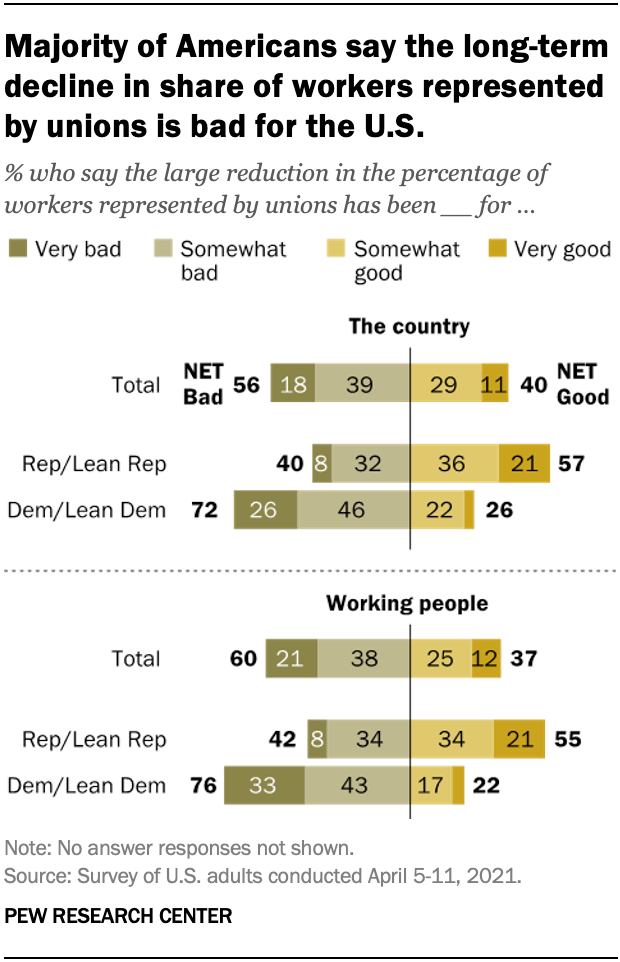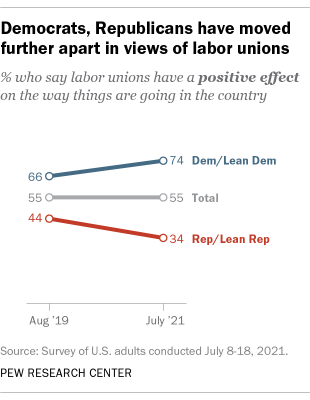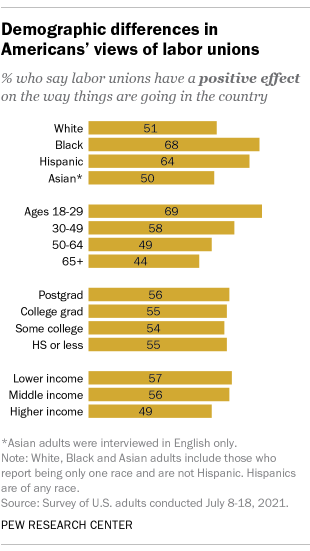As Labor Day approaches, a narrow majority of Americans continue to say labor unions have a positive effect on the way things are going in the United States. Most Americans also say the long-term decrease in the percentage of workers represented by unions is bad for working people in the U.S., and for the country as a whole, according to recent Pew Research Center surveys.
As of July, 55% of U.S. adults say labor unions have a positive effect on the way things are going in the country, unchanged from August 2019, the last time the Center asked this question. While the overall figure has remained the same, Democrats have become more likely – and Republicans less likely – to say unions have a positive effect.
Around three-quarters of Democrats and independents who lean to the Democratic Party (74%) now say labor unions have a positive effect on the way things are going in the country, up from 66% in August 2019. The share of Republicans and GOP leaners who say unions have a positive effect has fallen from 44% to 34% during that span. Democrats and Republicans have diverged in their views of several other institutions since 2019, too.
This analysis relies on data from Pew Research Center surveys conducted in July 2021 and April 2021. The July survey examines unions’ perceived effect on the way things are going in the United States today; it was conducted July 8-18, 2021, among 10,221 U.S. adults. The April survey – conducted April 5-11, 2021, among 5,109 U.S. adults – examines attitudes about the declining share of American workers who are represented by unions. For the exact questions in both surveys, as well as more information about their methodology, see the links above.
Everyone who took part in both surveys is a member of the Center’s American Trends Panel (ATP), an online survey panel that is recruited through national, random sampling of residential addresses. This way nearly all U.S. adults have a chance of selection. The survey is weighted to be representative of the U.S. adult population by gender, race, ethnicity, partisan affiliation, education and other categories. Read more about the ATP’s methodology.
Liberal Democrats are especially likely to see labor unions in a positive light, while conservative Republicans are especially likely to view them negatively. More than eight-in-ten liberal Democrats (83%) say unions have a positive effect on the way things are going in the U.S., but only around a quarter (27%) of conservative Republicans agree. Seven-in-ten conservative Republicans say unions have a negative effect on the way things are going in the country today.
Around two-thirds of Black adults (68%) and 64% of Hispanic adults say unions have a positive effect on the way things are going, compared with smaller shares of White and Asian adults (51% and 50%, respectively).
Younger adults see unions more positively than older Americans. For example, while 69% of those ages 18 to 29 say unions have a positive effect, fewer than half (44%) of Americans ages 65 and older say the same.
The percentage of American workers who belong to a labor union has declined in recent decades, despite a slight uptick last year amid the COVID-19 pandemic. In 2020, 10.8% of wage and salary workers ages 16 and older belonged to a labor union, down from 13.4% in 2000, according to the Bureau of Labor Statistics.

Six-in-ten U.S. adults say the large reduction in the percentage of workers represented by unions over the past several decades has been very or somewhat bad for working people, while a similar share (56%) say it has been very or somewhat bad for the country, according to an April 2021 Pew Research Center survey.
On these questions, too, Democrats and Republicans hold very different views. Around three-quarters of Democrats and Democratic leaners (76%) say the long-term decline in union representation has been very or somewhat bad for working people, while a similar share (72%) say it has been bad for the country. By contrast, most Republicans and GOP leaners say the decrease has been very or somewhat good for working people (55%) and for the broader nation (57%).
Among Republicans, attitudes about the long-term decline in unionization in the U.S. differ by demographic factors including age, education and income. While 72% of Republicans with higher incomes say the decline in unionization has been very or somewhat good for working people, fewer middle-income Republicans (55%) and Republicans with lower incomes (45%) share this view.

